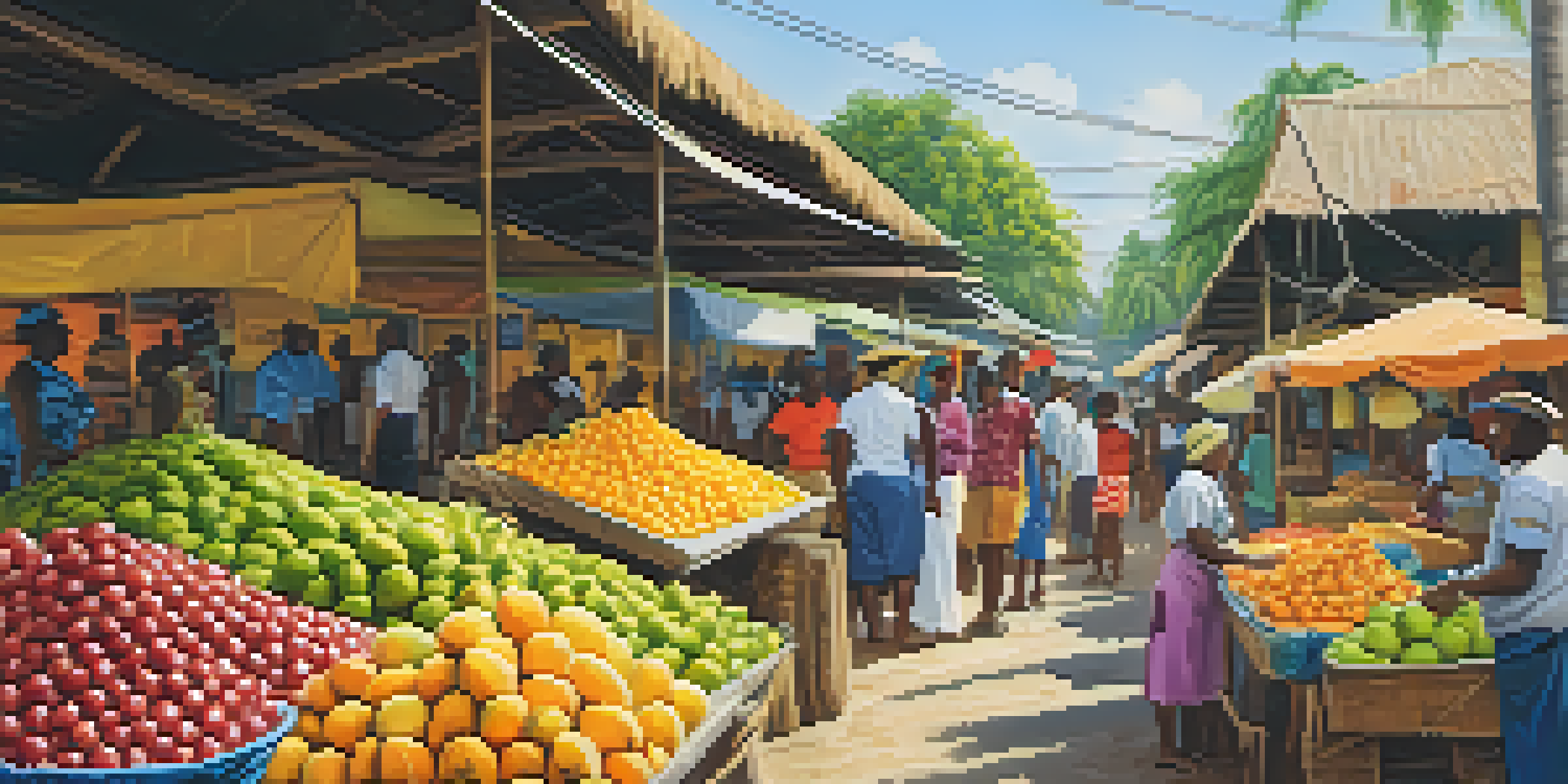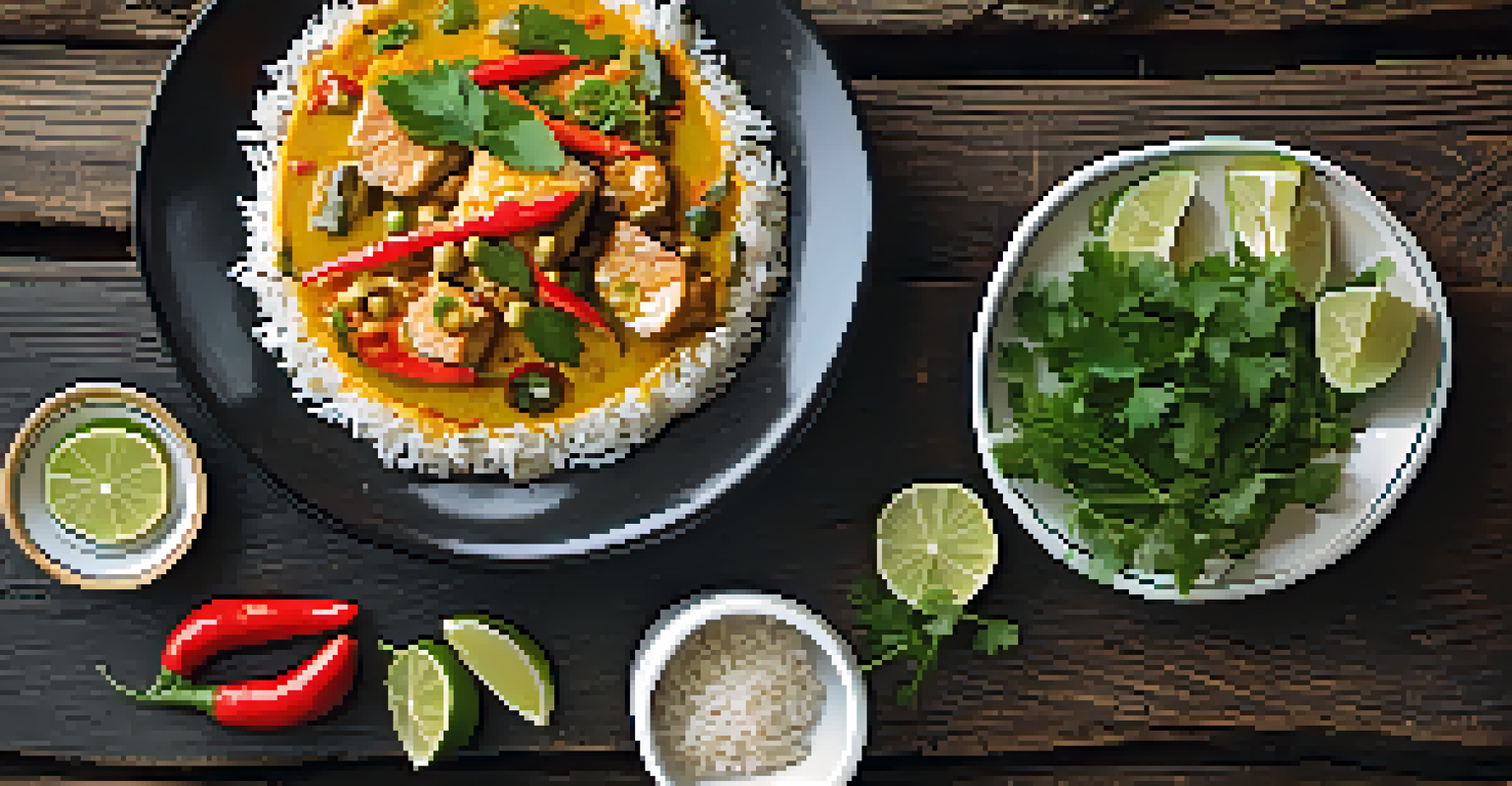Bahia’s Influence: The Richness of Afro-Brazilian Culinary Arts

The Origins of Afro-Brazilian Cuisine in Bahia
Afro-Brazilian cuisine has deep roots in Bahia, a state renowned for its rich cultural tapestry. This culinary art form emerged from the blending of Indigenous, African, and Portuguese influences, creating a unique gastronomic identity. The African slaves brought to Brazil contributed traditional cooking methods and ingredients, which transformed local dishes into something entirely new and flavorful.
Food is our common ground, a universal experience.
One prominent example is the use of dendê oil, or palm oil, which is a staple in many Bahian dishes. It adds a distinct flavor and vibrant color, making it a key ingredient in recipes like moqueca, a delicious fish stew. This combination of flavors reflects the resilience and creativity of the African diaspora, showcasing how they turned limited resources into a rich culinary tradition.
Today, this cuisine not only represents the history of Bahia but also serves as a symbol of cultural pride for Afro-Brazilians. It is celebrated in festivals, restaurants, and homes, where family recipes are passed down through generations, preserving this vital aspect of Brazilian identity.
Key Ingredients That Define Bahian Cuisine
Bahian cuisine is characterized by its vibrant and diverse ingredients that reflect the region's cultural influences. Staples like rice, beans, and cassava are often accompanied by seafood, tropical fruits, and spices, creating a flavor palette that is both bold and comforting. Each ingredient tells a story, connecting the dish to the land and its people.

One of the most notable ingredients is the use of seafood, especially in coastal areas where fish and shellfish are abundant. Dishes like acarajé, a deep-fried ball made from black-eyed peas and filled with spicy shrimp, highlight the region's connection to the ocean. The incorporation of fruits like mango, coconut, and lime adds a refreshing twist to many dishes, balancing the richness of the spices.
Culinary Roots in Bahia
Afro-Brazilian cuisine in Bahia merges Indigenous, African, and Portuguese influences, showcasing a unique gastronomic identity.
Furthermore, herbs and spices are crucial in Bahian cooking, with ingredients like cilantro, garlic, and chili pepper creating layers of flavor. The art of seasoning is a hallmark of Afro-Brazilian culinary techniques, showcasing how cooks can transform simple ingredients into extraordinary meals that evoke memories and traditions.
Celebratory Dishes: Festivals and Traditions
Food plays a central role in Bahian festivals, where community and culture come together to celebrate heritage through culinary traditions. Events like the Festa de Iemanjá honor the Afro-Brazilian goddess of the sea, featuring an array of traditional dishes offered as gifts. The act of cooking and sharing food becomes a way to connect with ancestors and the spiritual world.
Cooking is an act of love, a gift to those around us.
During these festivities, dishes such as moqueca and vatapá take center stage, showcasing the flavors of Bahia. These meals are often prepared in large quantities to feed the community, emphasizing the importance of sharing and togetherness. The vibrant colors and aromas fill the air, creating an atmosphere of joy and celebration.
Moreover, these gatherings often include music, dance, and storytelling, further enriching the experience. The combination of food and culture fosters a sense of belonging, reminding everyone of their roots and the enduring legacy of Afro-Brazilian culinary arts.
The Influence of African Heritage on Cooking Techniques
Afro-Brazilian culinary arts are deeply influenced by traditional African cooking techniques, which have been adapted and modified over time. Many of these methods emphasize communal cooking, where meals are prepared together, fostering a sense of unity. The use of clay pots and open-fire cooking reflects the ancestral practices brought from Africa, still cherished in Bahian kitchens today.
For instance, the slow-cooking method used in dishes like feijoada allows flavors to meld beautifully, resulting in hearty and satisfying meals. This technique highlights patience and care, essential traits in both cooking and community life. Such practices are not merely about food; they represent a way of life that honors heritage and tradition.
Vibrant Ingredients and Dishes
Key ingredients like seafood, tropical fruits, and spices create bold flavors that tell the story of Bahian culture.
Additionally, the act of preparing food is often seen as a ritual, with specific songs and prayers accompanying the process. This connection between cooking and spirituality underscores the profound respect for the ingredients and the ancestors who paved the way for this rich culinary landscape.
Modern Interpretations of Bahian Cuisine
In recent years, Bahian cuisine has experienced a renaissance, with chefs and food enthusiasts reinterpreting traditional dishes for contemporary palates. This modern twist often includes fusion elements, incorporating international flavors while staying true to the essence of Afro-Brazilian cooking. This evolution reflects the dynamic nature of culture, as it adapts and thrives in new contexts.
One exciting trend is the rise of gourmet acarajé, where chefs experiment with innovative fillings and upscale presentation while retaining the traditional essence. This creative approach not only attracts a new audience but also promotes awareness of the cultural significance behind each dish. By blending tradition with creativity, modern chefs are celebrating Bahia’s culinary heritage in exciting ways.
Moreover, the popularity of Bahian cuisine has spread beyond Brazil's borders, as food lovers worldwide discover its unique flavors. Food festivals and pop-up restaurants showcase these culinary delights, creating a bridge between cultures and fostering appreciation for Afro-Brazilian heritage.
Sustainable Practices in Bahian Cooking
Sustainability has become a crucial aspect of Bahian cuisine, with a growing emphasis on using local and seasonal ingredients. Many chefs and home cooks are reconnecting with nature, seeking to minimize their environmental impact while honoring traditional practices. This approach not only supports local farmers but also enhances the flavors of dishes, as fresh ingredients are often more vibrant and delicious.
The use of traditional fishing and farming techniques also plays a significant role in promoting sustainability. By respecting the land and sea, cooks ensure the preservation of resources for future generations. This mindful approach reflects the deep-rooted belief in the interconnectedness of community and environment.
Cultural Celebrations Through Food
Festivals in Bahia highlight the importance of food in celebrating heritage, fostering community, and connecting with ancestors.
Additionally, many restaurants are exploring zero-waste cooking, utilizing every part of the ingredient to reduce waste and enhance flavors. This innovative mindset demonstrates how modern Bahian cuisine can honor its heritage while adapting to contemporary challenges, creating a more sustainable and responsible culinary landscape.
The Global Impact of Bahia’s Culinary Arts
The influence of Bahia’s culinary arts extends far beyond its borders, inspiring chefs and food enthusiasts worldwide. As global interest in authentic and diverse cuisines grows, Bahian dishes are gaining recognition for their rich flavors and cultural significance. This global spotlight is helping to promote Afro-Brazilian culture, fostering appreciation for its history and traditions.
Moreover, international culinary events and festivals often feature Bahian cuisine, allowing chefs to showcase their skills on a global stage. This exposure not only elevates the status of Bahian dishes but also provides opportunities for cultural exchange and collaboration among chefs from different backgrounds. Through food, connections are made, stories are shared, and cultures are celebrated.

Finally, as more people seek to understand the origins of their food, the narratives behind Bahian culinary arts offer a deeper insight into the complexities of identity and heritage. These culinary stories highlight the resilience of the Afro-Brazilian community, reminding us of the power of food to bridge gaps and foster understanding across cultures.